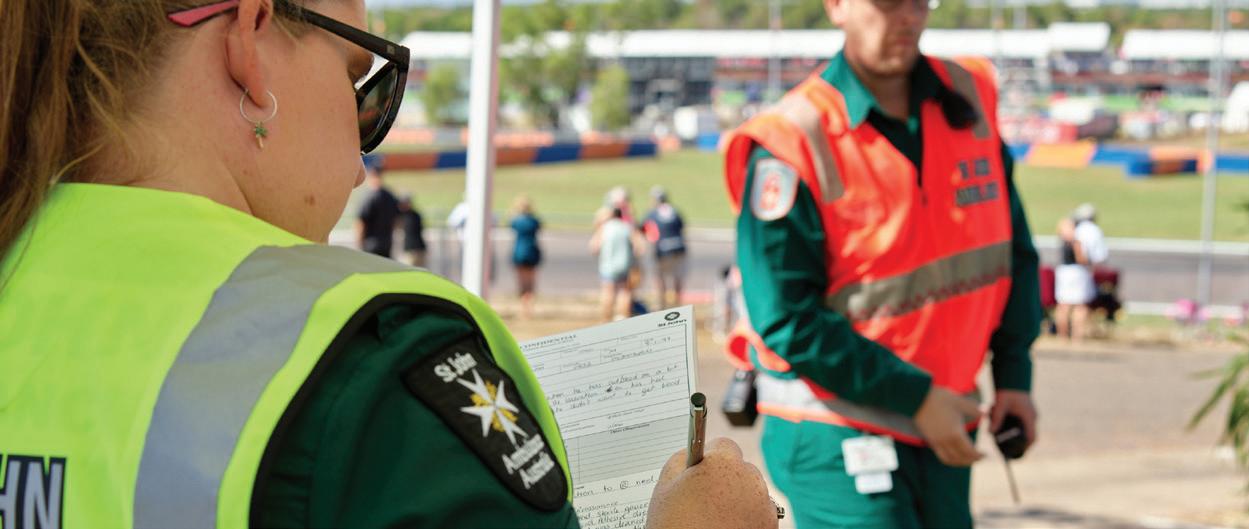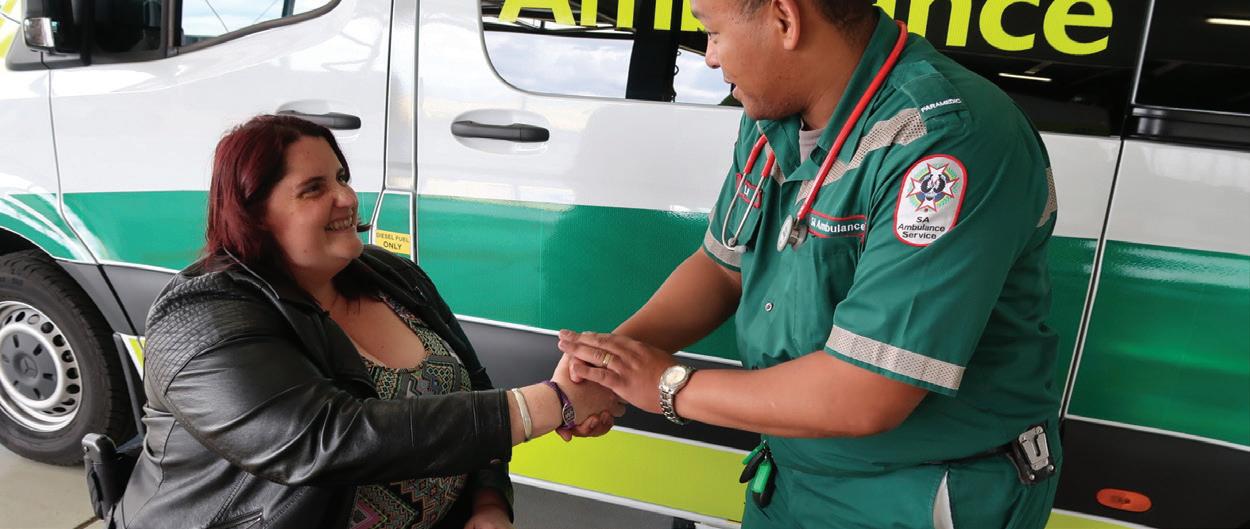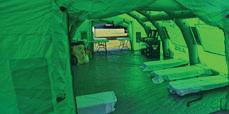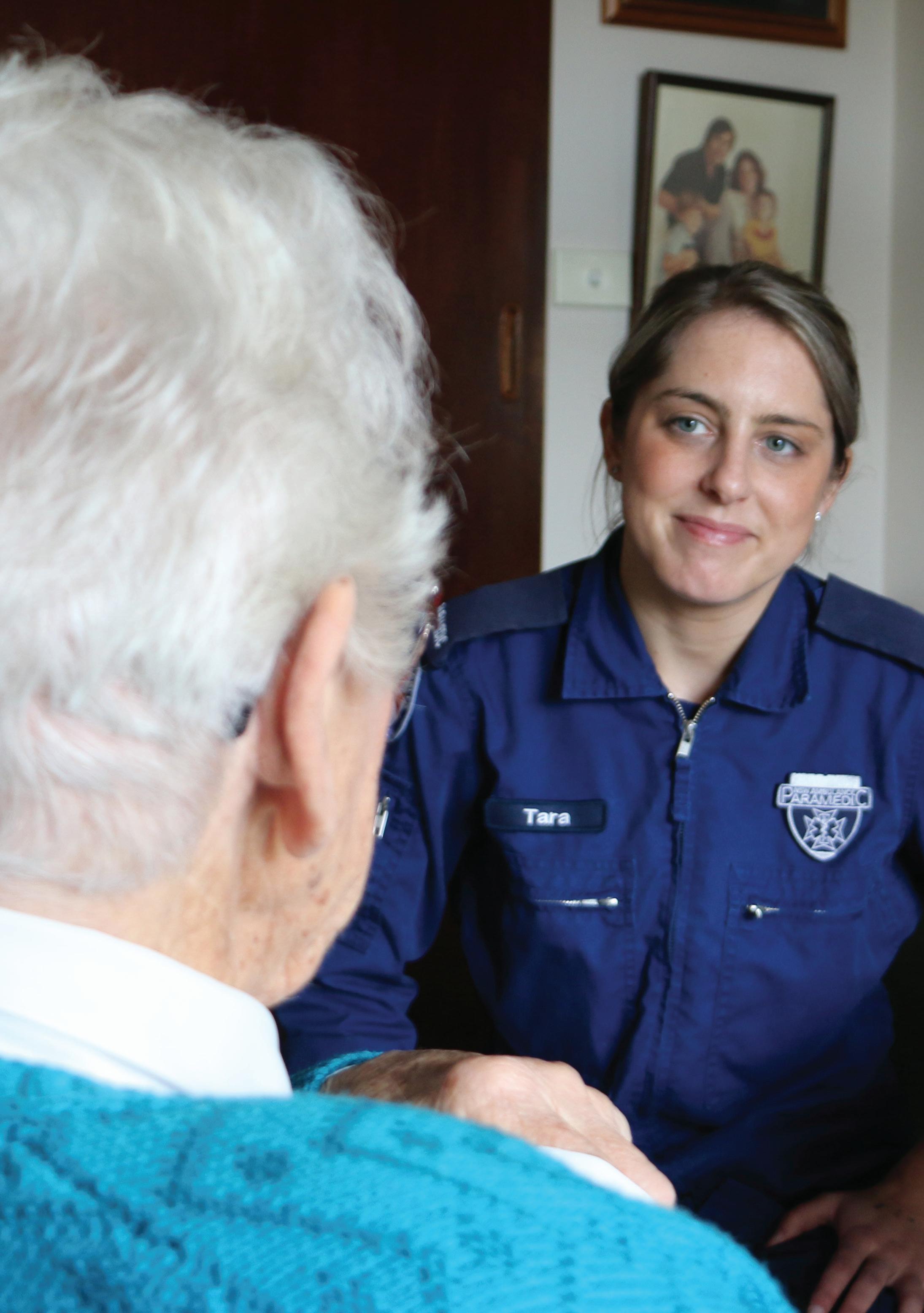
10 minute read
Excellence in Leadership
Excellence in
Leadership
This category is looking at management practice and operational improvement and innovation in: Management culture, open communication, accountability, management development, professional standards and diversity of workforce; and Operational protocols, work practices. (Related to how service delivery is provided). Previous submissions looked at accountability in leadership, enhancing opportunities for junior managers, taking the lead in occupational violence, and increased health outcomes for ATSI people. Each service is encouraged to analyze the programs they have implemented that pave the way in leadership for future generations of paramedics.
Excellence in Leadership Bringing consistent oversight to regional and remote ambulance operations
St John WA
Team: Ryan Marshall (team leader)
Operating over 100 volunteer sub centres across Western Australia, St John WA had the ongoing challenge of ensuring consistency with its services, not only from a patient experience perspective, but operationally too. The individual sub centres have responsibility for financial oversight and administration via a volunteer run committee, with the centres using a specially built accounting and billing system to avoid the complexity of the organisations primary accounting software.
Internal audits of St John WA’s systems raised issues with the ageing functionality, and its lack of integration with the primary accounting systems causing issues with financial governance the control environment, operational efficiency and customer experience.
With the St John Board having an obligation to present a Financial Report that represents a true and fair view to its users, the issues flagged by the audits needed urgent addressing. In addition, without robust financial management and information, the board and sub centre committees were unable make well informed decisions. St John WA needed to implement a new system to control its financial systems and operations that addressed the issues identified in the audit, but provided the simplicity required for everyday volunteer use.
The aim of this project was to address the functionality gap of the existing system, improving operational efficiency for users and the customer experience we could offer. The governance challenges flagged by internal audit would also be addressed, in particular with better integration of the system with the primary accounting system. The intent was to have a single accounting system for the organisation, with interfaces developed to reduce the complexity for volunteer centres in interacting with the system. In addressing these issues, St John WA would continue to provide its country sub centres and its committee with the ability to control the transactions that impact their centre and continue to provide the St John Board and committee with the financial reporting capability to allow for informed decision making along with improving operational efficiency and customer aspects.
Excellence in Leadership COVID-19 Safety Plan A return to normal for Territory events
St John Ambulance Australia NT
Team: Andrew Thomas (team leader), Nicole Johnston and Andrew Everingham As the global pandemic hit Australia, one of the first responses was to cancel public events amid concerns they would become super spreader situations.
While the situation was ever-changing, the Northern Territory was fortunate to have no community transmission, allowing borders to open to interstate visitors. Discussions commenced regarding whether large public events, which were planned as part of a normal dry season events program, would proceed. To provide medical care for these gatherings in a pandemic was a challenge and required the development of a COVID-19 Safety Plan alongside the medical plans for such events. One of the first events held was the V8 Supercars. Due to the scale of the event St John NT worked in conjunction with National Critical Care and Trauma Response Centre (NCCTRC) to provide medical services. This was the first sporting event in Australia to have a large local and interstate attendance. St John NT produced a COVID-19 Safety Plan which was extremely successful in its implementation. It was adapted to future Territory events, including the biggest event in Australia at the time - Darwin Waterfront New Year’s Eve. Most recently it was implemented for Bass in the Grass musical festival with 14,000 attendees. The aim of the COVID-19 Safety Plan was to supplement the existing event medical plans with safety precautions and assessment tools which had been developed for ambulance response to the pandemic.
The COVID-19 Safety Plan was designed to be used by all levels of medical personnel at events and was first utilised at the V8 Supercars, over two weekends in August 2020. Development of the Plan contributed to the safe return of significant Territory events, and the flow on effect of social, economic and community wellbeing.
Excellence in Leadership Fair and Inclusive Practice Network and QAS RESPECT
Queensland Ambulance Service
Team: Kelly-Anne McGruer (team leader), Nicola Busch, Renee Kane and Conor Fardon
In 2020, the QAS strengthened its commitment to its workforce by launching the Fair and Inclusive Practice Network (FIPN) in January, followed by the QAS RESPECT initiative in September. Both of these innovative and contemporary initiatives are overseen by the Fair and Inclusive Practice Unit (FIPU), within the Office of the Commissioner. They have been specifically designed for the QAS to drive long-term and sustainable cultural change within the frontline ambulance environment.
FIPN is a workforce led initiative with a strong focus on the fundamental principles of equity, fairness and inclusion. The Network has 46 dedicated FIPN Officers located across the state and a coordinator within the Office of the Commissioner, who supports reform within the key focus areas of flexible work, transition to retirement, parental leave, working whilst caring, respect at work, and reducing domestic and family violence. The Network functions as a local and statewide feedback mechanism and provides support for staff and managers, ensuring vision is translated into tangible outcomes for employees at every level. The QAS goal is to foster a culture where inappropriate workplace behaviour is not accepted, where all employees model respect and where systems, structures and policies reinforce the QAS’s commitment to a flexible, fair, inclusive and respectful culture.
QAS RESPECT aims to reform the workplace culture through informing, educating and empowering the workforce to intervene and eliminate inappropriate workplace behaviour, ensuring issues are handled efficiently and professionally every time. Through the QAS RESPECT Steering Committee and QAS RESPECT Working Group, building blocks have been put in place to start long lasting, tangible change in the organisation.
Excellence in Leadership Implementation of the first SAAS Consumer and Community Engagement Framework
SA Ambulance Service
Team: Natalie Gibson, Manager, Communications and Strategic Engagement (team leader) SA Ambulance Service (SAAS) developed a Consumer and Community Engagement Framework in collaboration with consumers to provide a blueprint for engagement and to improve health outcomes/service delivery for all South Australians. The framework was launched in January 2020 and is already leading the way in successful consumer engagement across health services in the State.
Implementation has been over a 12-month period.
Effective partnerships exist when consumers are treated with dignity and respect, when information is shared with them, and when participation and collaboration in healthcare processes is supported and embedded across the organisation. In short, we believe that engaging with our consumers will result in better outcomes, decisions, project, policies, programs and better (or more efficient) use of public resources. By engaging with a diverse range of consumers and communities including our ageing population, Aboriginal and Torres Strait Islander peoples, migrant communities and LGBTQIA+, and those with diverse health and mental health issues we hope to deliver culturally safe and meaningful services to all South Australians.
The framework also supports the achievement of Standard 2 of the National Safety and Quality Health Service Standards – Partnering with Consumers.

St John New Zealand
Team: James Stewart (team leader)
St John New Zealand maintain Major Incident (MI) caches at strategic locations across New Zealand, as well as a small vehicle infrastructure to enable deployment of major incident resources to large scale disasters. However, there had been no nationally consistent team structure, or set of competencies to ensure equitable provision of major incident support nationally. A nationally consistent platform was needed to standardise training and competencies, and uniform principles of deployment to ensure a more equitable and accessible major incident support function. In the second half of 2020, this framework was developed, and volunteer recruitment commenced for Major Incident Support Teams (MIST).
Additionally, there has been consultation and development of training guidelines, vehicle creation, layout, and content, and deployment tools to ensure effective and timely dispatch of Major Incident resources to an expanded range of incidents that would benefit from MIST attendance. This platform is being rolled out nationally over the next three years and already resulted in changing operational protocols and work practices, particularly around the service delivery of MI support and increased deployment of support to recent major incidents. The aim of this project was to enable a volunteer workforce to deploy to major incidents, from medium scale to large scale emergencies, events, and disasters. This builds on existing infrastructure St John maintains, such as Command resources and mobile triage and treatment equipment (tents, lighting). It seeks to increase the utilisation of this equipment by supporting this with a dedicated, non-clinical team focused solely on the supporting and peripheral aspects of major incidents, rather than getting distracted with the provision of prehospital care.
A previous issue impacting major incident support equipment deployment was expertise around equipment and process being held by senior clinicians, that during the incidents, had no capacity to focus on the support process in favour of being directly involved in the treatment and transport of acute patients. The aim was to delineate clinical and support roles, and ensure consistent deployment of MIST resources unimpeded by clinical workload or current personnel availability.

Ambulance Victoria
CATEGORY WINNER
Team: Sally Mangan (team leader) Ambulance Victoria (AV) is a leader in sustainability among health services in Victoria, Australia and New Zealand, and globally. AV is also the first ambulance service in Australia and NZ to develop a sustainability action plan and establish a dedicated sustainability team, and are a founding member of a new international ambulance sustainability group. AV’s Social and Environmental Responsibility Framework and Action Plan takes bold steps to reduce the impact of their organisational footprint and engage their people as part of a more socially and environmentally conscious organisation. AV’s commitment is in line with Government objectives and they are sharing our progress to encourage other health and ambulance services to be more sustainable. In 2020 they became the first Victorian health service, and the first ambulance service across Australia and NZ, to make a commitment to 100% renewable energy and announced their commitment to net zero, including emissions reduction targets for 2025 (39% reduction) and 2030 (60% reduction). To better support disadvantaged groups and social enterprises in Victoria through purchasing decisions, AV developed an AV Social Procurement Framework and targets for social procurement. They are also embedding new social impact measurements for community engagement. They developed the framework to cover both social and environment responsibility as a holistic approach as a responsible ambulance service. Their vision for social and environmental responsibility is directly linked to their Patient Care commitment to ensure Best Care is provided to every patient, every time.
AV made a commitment to 100% renewables by 2025, the first such commitment from a Victorian health service and also a first for Australia and New Zealand ambulance services. This includes a new power purchase agreement that went live in July 2020 to procure renewable energy for 14 of our larger sites, reducing AV’s emissions by 7%, and investment in on-site solar and lighting upgrades. AV have established a pilot project currently rolling out an energy resilience test site for solar and battery storage in the Grampians. AV also commenced a project to develop a net zero ambulance branch concept design to accelerate sustainability goals..








